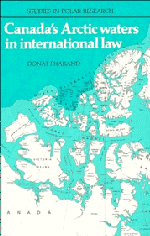Book contents
- Frontmatter
- Contents
- Figures
- Tables
- Foreword
- Preface
- Acknowledgements
- Part 1 The Waters of the Canadian Arctic Archipelago and the Sector Theory
- Part 2 The Waters of the Canadian Arctic Archipelago as Historic Waters
- 5 The basic characteristics of historic waters
- 6 Requirements of historic waters
- 7 State practice of Arctic states on historic waters
- 8 Historic waters applied to the Canadian Arctic Archipelago
- Notes
- Part 3 The Waters of the Canadian Arctic Archipelago and Straight Baselines
- Part 4 The Waters of the Canadian Arctic Archipelago and the Northwest Passage
- Notes
- General Conclusion
- Appendix A The 1825 Boundary Treaty, Great Britain and Russia
- Appendix B The 1867 Boundary Treaty, United States and Russia
- Selected bibliography
- Index
7 - State practice of Arctic states on historic waters
Published online by Cambridge University Press: 20 January 2010
- Frontmatter
- Contents
- Figures
- Tables
- Foreword
- Preface
- Acknowledgements
- Part 1 The Waters of the Canadian Arctic Archipelago and the Sector Theory
- Part 2 The Waters of the Canadian Arctic Archipelago as Historic Waters
- 5 The basic characteristics of historic waters
- 6 Requirements of historic waters
- 7 State practice of Arctic states on historic waters
- 8 Historic waters applied to the Canadian Arctic Archipelago
- Notes
- Part 3 The Waters of the Canadian Arctic Archipelago and Straight Baselines
- Part 4 The Waters of the Canadian Arctic Archipelago and the Northwest Passage
- Notes
- General Conclusion
- Appendix A The 1825 Boundary Treaty, Great Britain and Russia
- Appendix B The 1867 Boundary Treaty, United States and Russia
- Selected bibliography
- Index
Summary
The doctrine of historic waters not having been spelled out in any convention, its precise legal context remains difficult to circumscribe in customary law and, consequently, State practice becomes even more significant than otherwise would be the case. This is particularly so with respect to States situated in the Arctic, since the claim of historic waters being appraised is to a maritime area of that region. This chapter will examine the State practice of Norway, Denmark, the United States, the Soviet Union and Canada.
State practice of Norway
In 1951, Norway relied on history, in addition to the straight baseline system, as a basis for its claim that the waters of the fjords and sunds enclosed by the baselines were internal waters. It was invoking history as a subsidiary ground only, not in support of a claim of historic waters but rather one of consolidation of title over some of the areas of the sea enclosed by straight baselines. This consolidation of title was shown to exist in particular with respect to the Lopphavet Basin where the local inhabitants had enjoyed historic fishing and whale hunting rights. Norway does not appear to rely now, any more than it did in the past, on historic waters properly so-called and there is no provision for such waters in its legislation.
State practice of Denmark
There is no evidence that Denmark has ever made any claim of historic waters. It has used the straight baseline system along the coasts of Greenland and the Faroes, but the waters enclosed are not claimed as historic waters. Denmark has no provision for historic waters in its legislation.
- Type
- Chapter
- Information
- Canada's Arctic Waters in International Law , pp. 106 - 112Publisher: Cambridge University PressPrint publication year: 1988



